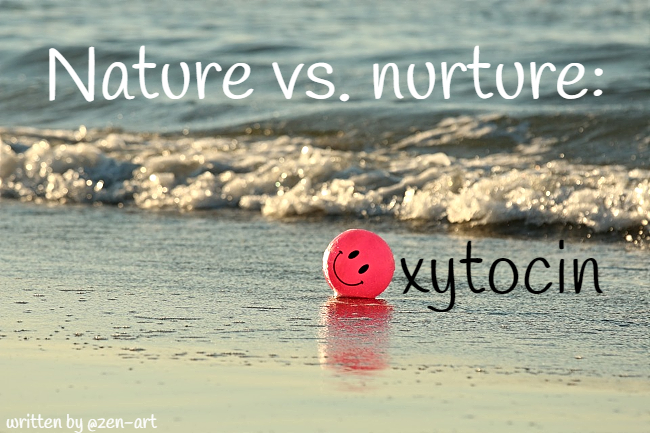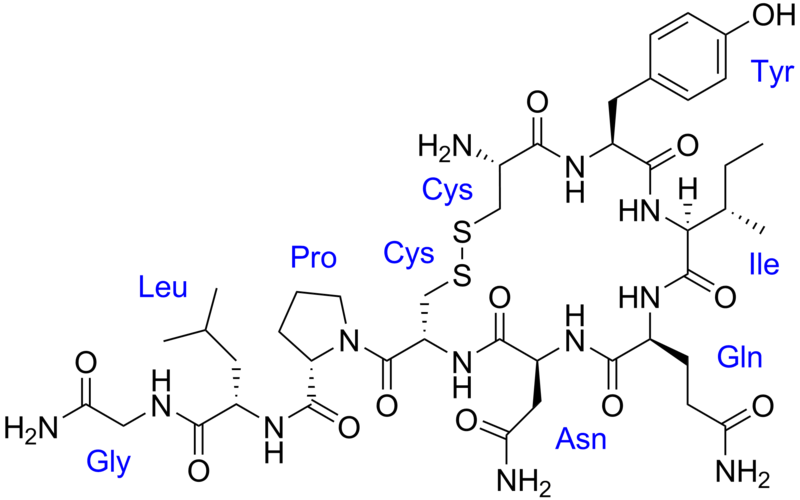You know me, always a skeptic. I am a happy little critical thinker that never takes anything for granted and believes how nothing ever is written in stone when it comes to human biology and psychology. Yes, I used those two in the same sentence and stayed alive, who would have known? In the age of information, ignorance is a choice, remember that. Once we believed the Earth was flat and the Sun revolved around it, some men even died at the hands of the Church defending that claim, just ask Giordano Bruno. Oh, wait, you cant. Once we believed how atoms were the smallest particles and you could blame your mother for absolutely everything wrong in your life. Once we even believed that genes determine who we are and there is nothing we can do about it. Nature vs. nurture debate continues to spiral throughout the centuries filled with interesting scientific discoveries. Here and now, for the pleasure of your mind, it lands on oxytocin.
 CCO image, Pixabay, author: Pexels, adapted by @zen-art
CCO image, Pixabay, author: Pexels, adapted by @zen-art
The trust hormone, social neurotransmitter, and the hormone of love are all just cute nicknames for oxytocin. In the last ten years, many scientists were interested in this little guy and devoted much of their time in researching its importance in human lives. From maternal instincts and postnatal depression, orgasms, social bonding and altruism, depression and anxiety, to supporting spirituality, oxytocin seems to have its proverbial fingers dipped in quite a lot of things.


Oxytocin was discovered by Henry Dale in 1906. while its molecular structure was determined some fifty years later, in 1952. The word oxytocin comes from Greek oxys and toketos which mean "quick birth". It was probably named in this manner because it is released into the bloodstream as a hormone when the cervix and uterus get stretched during labor.
Oxytocin (Oxt) is a peptide hormone and neuropeptide. Oxytocin is normally produced in the hypothalamus and released by the posterior pituitary.
--Wikipedia
 Oxytocin with labels, Wikimedia Commons, public domain image
Oxytocin with labels, Wikimedia Commons, public domain image
As the quote from Wikipedia so nicely says, oxytocin is normally produced in the hypothalamus. This means that cells containing oxytocin are not exclusive to the brain. They were found in tissues of ovaries, placenta, testicles, retina, and pancreas, just to name a few. Some general info that you need to know about it before we continue is:
-
a mammalian hormone
-
a neurotransmitter in the brain
-
released during labor
-
released after stimulating nipples
-
released during orgasm
-
involved in social recognition
-
associated with empathy
-
females usually have higher levels
-
released when people snuggle
-
counters the effects of cortisol
-
Pitocin is a synthetic version


Back in 2012, there was a research about people in the first stages of romantic attachment who had higher levels of oxytocin and they had them for the minimum of 6 months. 163 young adults were examined; 60 couples and 43 non-attached singles. They were in dyadic interactions and were interviewed about their relationship-related thoughts and behaviors. New lovers had substantially higher levels of oxytocin than single people. Findings of the research support evolutionary models which suggest that parental and romantic attachment share underlying mechanisms mediated by the oxytocin. You can read the full study here:
Maternal love...
When it comes to maternal feelings, 2018 was a breakthrough year because scientists from Louisiana State University discovered a group of cells in female mouse brains that are activated by oxytocin. Those cells were not found in male mouse brains.
The expression of oxytocin receptors in the cells are present only when estrogen is present too. This implies not only that the cells are involved in causing maternal behavior but also the existence of a connection between lower levels of oxytocin and postpartum depression. The good news here is how there is a huge new potential of treating postpartum depression with drugs which will target those oxytocin receptor cells. You can read the full study here:
A double-blind study from 2018 showed how oxytocin strengthens mothers' neural responses to infant and adult faces.
Researchers used EEG to measure the mothers' neural responses to faces but they first gave them either a placebo or an oxytocin nasal spray. Oxytocin increased the N170 component of the EEG signal which reflects activation of brain areas sensitive to faces. The research did conclude how oxytocin activated those areas more than the placebo but there were no specific differences between adult and children faces. Much more research is needed to confirm if this happens only to mothers (only mothers of 1-year-old infants were in the study) or to all females or even to both genders. You can read that study here:
There is a good review from 2013 that summarized all the oxytocin’s possible relationship-enhancing effects from trust and empathy to even fidelity that you can read here:


Did you know that people with higher oxytocin levels were more likely to donate to refugees and people in need? If this sounds too stretched to you just remind yourself that oxytocin is a part of the happy quartet of molecules (endorphins, dopamine, oxytocin, and serotonin). Happy people tend to be... Well, happier. Those who are happy tend to spread their happiness around which makes these findings not that surprising to me. It is perfectly normal and even evolutionary established how people are more altruistic towards their family and friends than they are to strangers. What should be a normal stance in the 21st century is that you may prefer your family but you should not hate those which are not a part of it. This is a completely different matter so I won't digress from the topic at hand. Lets circle back to the actual research...
Researchers at the University of Bonn, the Laureate Institute for Brain Research in Tulsa (USA), and the University of Lübeck tested 183 German individuals in 3 experiments. First, they gave them an option to donate (by clicking on the computer) to 50 people who were described as either local people in need (25 of them) or refugees in need (also 25 of them). Participants could either donate 0 or 1 euro with any remaining sum that was not donated going to the participants themselves. The second experiment was the same but with either oxytocin nasal spray or placebo, and the third was presenting the participants with the average donation their peers made in the first experiment before allowing them to repeat the experiment.
"Given the right circumstances, oxytocin may help promote the acceptance and integration of migrants into Western cultures"
--Rene Hurlemann, one of the researchers
Under the influence of oxytocin in the second experiment, participants who had previously shown a positive attitude towards refugees doubled their donations to both the locals and the refugees but the oxytocin had no effect in participants who had a defensive attitude towards refugees. This implies how oxytocin increases generosity but ONLY if the altruistic attitude is present. Oxytocin can not create altruism but it can strengthen it. Social norms in combination with oxytocin are the real approach as the last experiment has shown how even people with negative attitudes donated up to 74 percent more to refugees than they did before. In this social context, oxytocin increases trust which has been demonstrated in previous studies where it has been proven that its levels in the blood increase during social interaction and shared activities. The research is available here:
I also suggest you take a look at research which shows how oxytocin improves synchronization of movement between participants by enhancing sensorimotor predictions. Read about it here:


Optimism, self-esteem and the belief that a person has control over her own life (referred to as "mastery") are 3 crucial things in psychology which determine how well we deal with stress and depression. Oxytocin has been linked to them in 2011 by the researchers of UCLA who identified the oxytocin receptor gene (OXTR) which is associated with psychological issues and health. The oxytocin receptor gene has two versions: an "A" (adenine) and "G" (guanine) variant. When people have two "A" nucleotides or one "A" and one "G" at a specific location on the oxytocin receptor gene, they have much lower levels of optimism, self-esteem, and mastery along with higher levels of depressive symptoms than those with two "G" nucleotides.
"Sometimes people are skeptical that genes predict any kind of behavior or psychological state. I think we show conclusively that they do,"
--E. Taylor, member of the National Academy of Sciences and director of UCLA's Social Neuroscience Laboratory.
What does it mean?
And here comes the nature vs. nurture debate all over again. Are you destined to become depressed if your genes come in certain variations or can they be overplayed by parenting, society, and self-actualization? The researchers stressed out how genes are not destiny but only factors in our development. They even said how a mother's tending can completely eliminate the potential effects of a certain gene. The environment is crucial for genes because you can have two sets of identical genes in a different environment and they will not produce the same traits. You can read this very interesting study here:


Who should you blame for your oxytocin levels in the end, your genes or your mother? How about not blaming anyone except yourself? Yeah yeah, taking responsibility for your own life is a bi*#$ but you should try it. There is something quite liberating in it. There are many factors which determine who you are but never forget that you are the one that is always in control. Do not allow all those years of evolution of your prefrontal cortex go to waste and take power over your own life. You are not governed by your genes and you most certainly are not governed by the opinion of your mother.
And now what?
Now you get to choose. You are free to blame whoever and whatever you want. That option of avoiding responsibility is there for you but is not very beneficial and almost never has positive effects. Nature, nurture or a combination of the two with a high influence of your own decision-making process? Try the last one and accept that you are the most important factor in your own story. Do you remember what I told you at the beginning of the text? I even said how you should remember it. IN THE AGE OF INFORMATION, IGNORANCE IS A CHOICE. Always read more and always learn more. Follow the latest research and experiment with different methods of keeping yourself happy and healthy. Do not aim for happiness once you achieve something but allow happiness to be your steady companion in everything you do and everywhere you go. Smile. You are gorgeous when you smile.

If you are interested in learning more about this topic, CHECK OUT THESE REFERENCES:
Until next time,
KEEP YOUR SMILE ON!



Image sources AND LICENCES in order of appearance:
- all images used in this post are free for commercial use, they are royalty free with the links to original images provided under them
- titles are made with the CC0 image from Pixabay that can be found
#steemstem
#biology
#psychology
#thealliance
#ecotrain
Payout: 0.000 HBD
Votes: 616
More interactions (upvote, reblog, reply) coming soon.
 CCO image, Pixabay, author: Pexels, adapted by @zen-art
CCO image, Pixabay, author: Pexels, adapted by @zen-art

 Oxytocin with labels, Wikimedia Commons, public domain image
Oxytocin with labels, Wikimedia Commons, public domain image
















